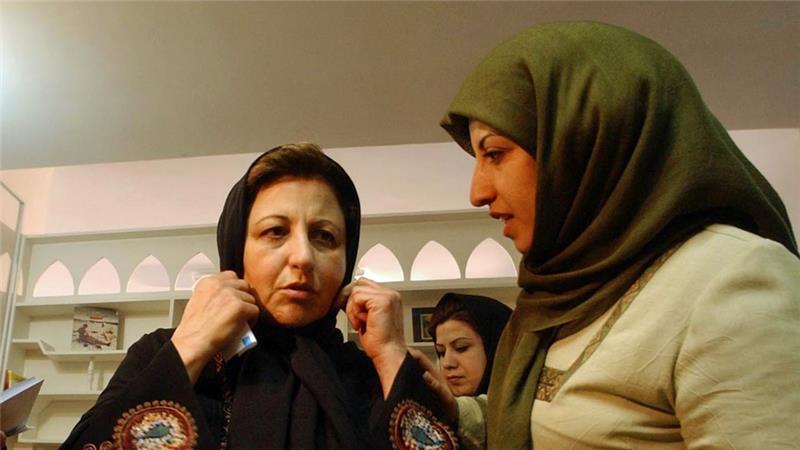Souce: Al Jazeera
Report says security forces arrest Narges Mohammadi days after she was charged with crimes “against national security”.
Iranian Nobel peace laureate Shirin Ebadi (left) speaks with fellow activist Narges Mohammadi [AP Photo]
Iranian security forces have arrested a prominent activist just days after she was charged in court with crimes “against national security”, a human rights group has said.
Narges Mohammadi, a senior leader of the banned Defenders of Human Rights Centre, was “forcibly arrested” early on Tuesday from her house in the Iranian capital, Tehran, according to the Norway-based Iran Human Rights (IHR) group.
The report said that security forces entered her house and arrested her, after she refused to open her door.
Her arrest was also confirmed by her husband, Taghi Mohammadi, who spoke from Paris to Radio Free Europe Radio Liberty.
| Being in a human rights organisation, or speaking on behalf of human rights victims is not a crime. |
IHR spokesman Mahmood Amiry-Moghaddam “strongly condemned” the arrest saying, it “indicates the low tolerance of the Iranian authorities for peaceful activities”.
He called for international diplomatic pressure on Iran to demand Mohammadi’s “immediate release”.
It was unclear where Mohammadi has been detained, although she had previously been imprisoned in Zanjan jail and Evin Prison.
It was also unclear whether the arrest was related to the latest charges against her. But Faraz Sanei, a spokesman at Human Rights Watch told Al Jazeera, it could also be related to a previous six-year sentence, for which Mohammadi served a part of, and was released early due to an illness.
Sanei said sources in Tehran reported that the security forces served Mohammadi a warrant of arrest.
Civil activities
On May 1, Mohammadi told the US-based group International Campaign for Human Rights in Iran (ICHRI) that she is facing three charges including “propaganda against the state”, “assembly and collusion against national security”, and “establishing the anti-security and illegal ‘Step by Step to Stop Death Penalty’ group”.
Step by Step to Stop Death Penalty, also known by its Farsi acronym LEGAM is the campaign established by Iranian activists trying to abolish the capital punishment in the country.
“The reasons for these charges are almost entirely based on my civil activities over the past two years,” Mohammadi was quoted by ICHRI report as saying.
She said that her interviews with media outside Iran, and her meetings with Nobel Peace laureate Shirin Ebadi and then European Union foreign policy chief, Catherine Ashton, also made her a target of Iranian authorities.
Authorities also told her that she is banned from foreign travel.
Mohammadi said that the Tehran court handling her current case had barred her lawyers from reviewing her case file.
She has been previously arrested after the disputed 2009 presidential elections, and was sentenced to 11 years in prison in October 2011. Her sentence was later reduced to six years in prison at the appeals level.
Due to an illness, she was released on bail from Zanjan Prison after paying a reported $200,000 bond.
Sanei, of Human Rights Watch, called on the Iranian court to drop all the charges against Mohammadi and demanded her “immediate release.”
“Being in a human rights organisation, or speaking on behalf of human rights victims is not a crime,” he said.
“But we do know that the [Iranian] judiciary is one of the main perperators of human rights abuses for a long time, especially after 2009,” Sanei said, adding that the judges in the revolutionary courts are notorious for handing down very harsh sentences.
He also called on the administration of President Hassan Rouhani to speak more publicly against the continuing imprisonment of political activists.
“We don’t believe that he has done enough on this front.”


